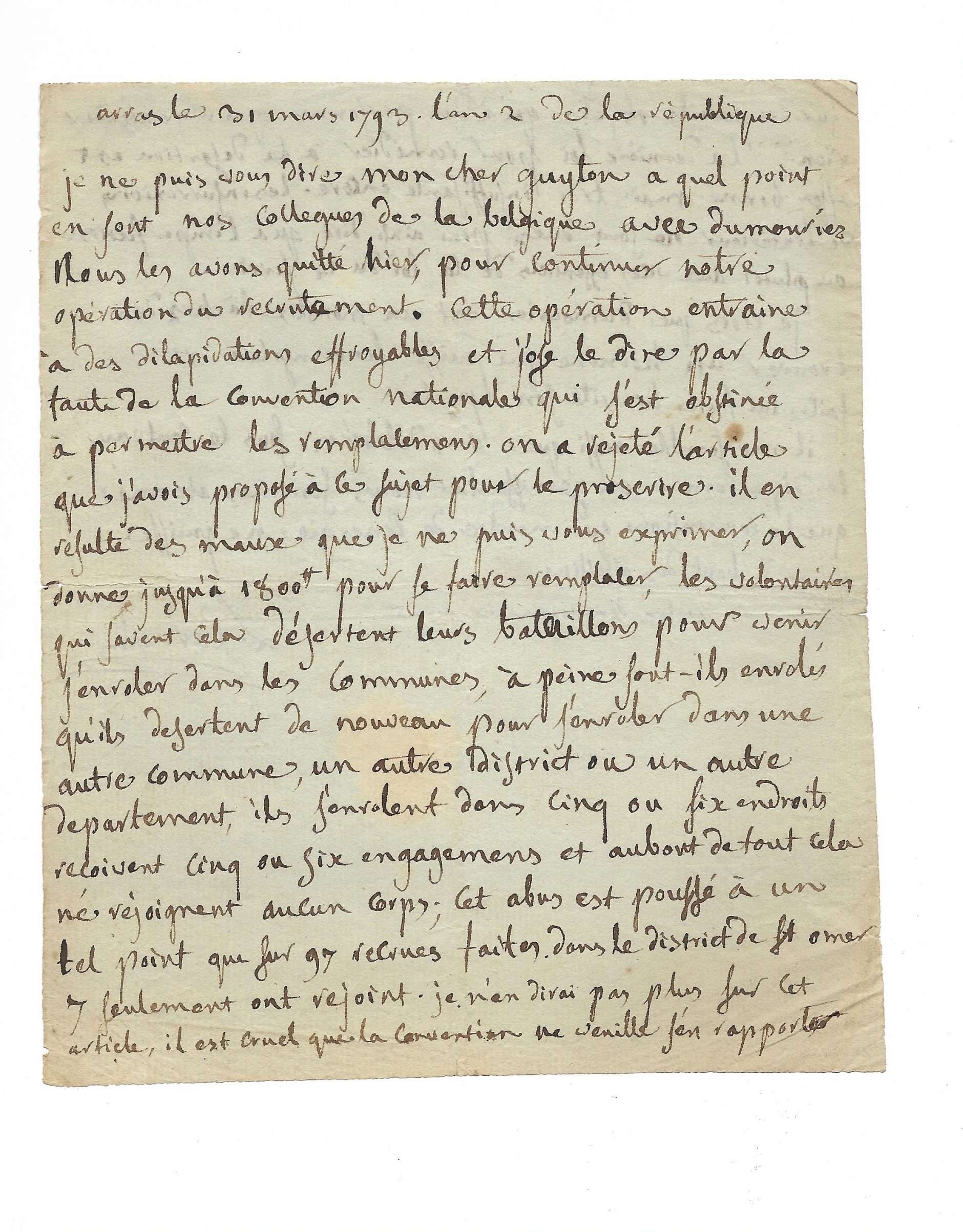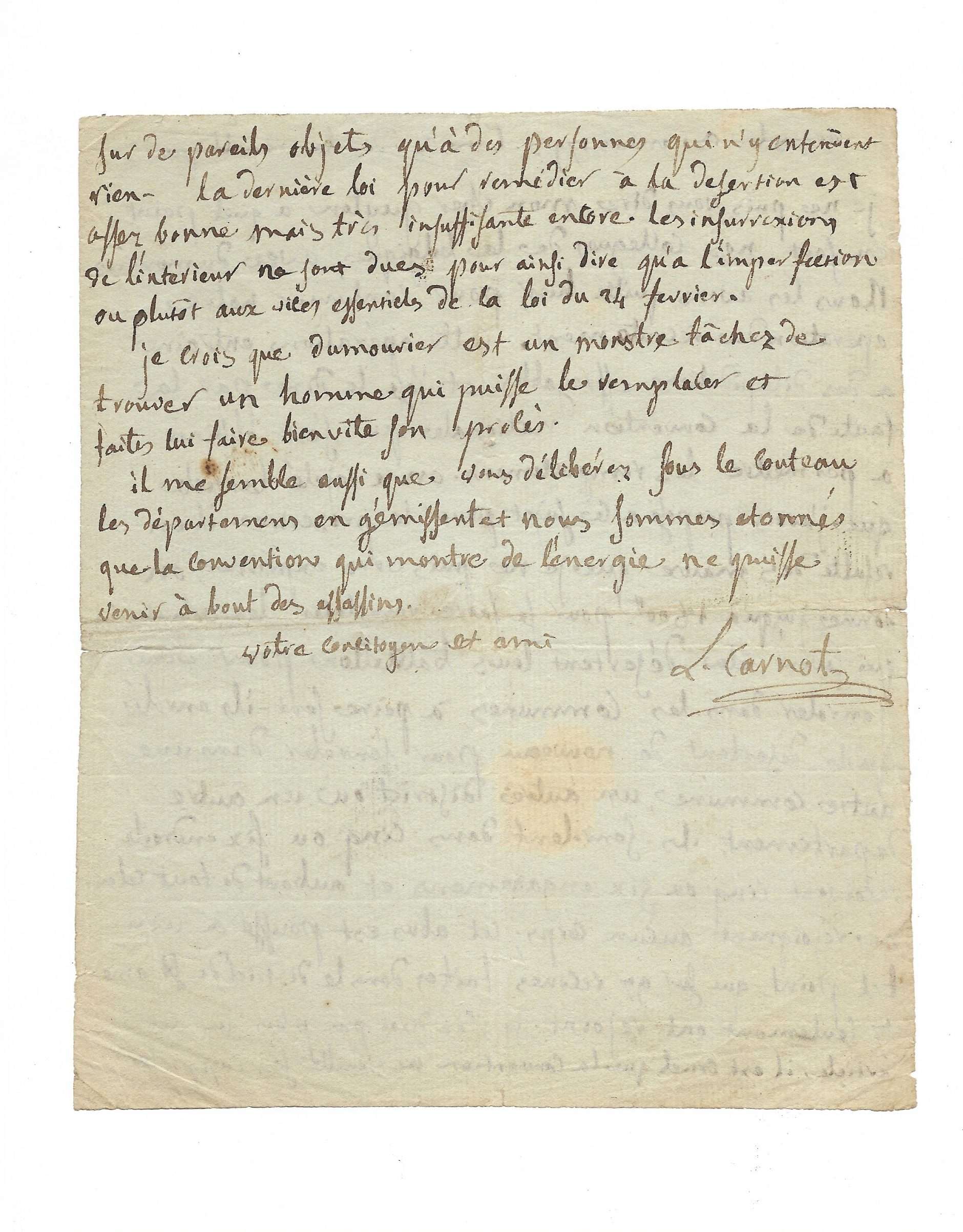CARNOT, Lazare (1753-1823)
Autograph letter signed “L. Carnot” to Louis-Bernanrd Guyton
Arras, 31st March 1793, 1 p. 1/2 in-8
“I believe Dumouriez to be a monster“
Fact sheet
CARNOT, Lazare (1753-1823)
Autograph letter signed “L. Carnot” to Louis-Bernanrd Guyton
Arras, 31st March 1793, 1 p. 1/2 in-8
Central fold mark, some brown stains in margin
Exceptional letter from Carnot after the debacle of the French Army in Neerwinden and a few hours from Dumouriez’s betrayal
“I believe Dumouriez to be a monster, try to find a man who can replace him and have him tried very quickly”
“Arras Le 31 mars 1793. L’an 2 de la République
Je ne puis vous dire mon cher Guyton à quel point en font nos collègues de la Belgique avec Dumouriez. Nous les avons quitté hier, pour continuer notre opération du recrutement. Cette opération entraine à des dilapidations effroyables et j’ose dire par la faute de la Convention Nationale qui s’est obstinée à permettre les remplacemens. On a rejeté l’article que j’avois proposé à ce sujet pour le proscrire. Il en resulte des maux que je ne puis vous exprimer, on donne jusqu’à 1800 livres pour le faire remplacer, les volontaires qui savent cela désertent leurs bataillons pout venir s’enroler dans les communes, à peine sont-ils enrolés qu’il désertent de nouveau pour s’enroler dans une autre commune, un autre district ou un autre département, il s’enrolent dans cinq ou six endroits recoivent cinq ou six engagements et au bout de tout cela ne rejoignent aucun corps, cet abus est poussé à un tel point que sur 97 recrues faites dans le district de St Omer 7 seulement on rejoint. Je n’en dirai pas plus sur cet article, il est cruel que la Convention ne veuille s’en rapporter sur de pareils objets qu’à des personnes qui n’y entendent rien. La dernière loi pour remédier à la desertion est assez bonne mais très insuffisante encore. Les insurrections de l’intérieur ne sont dues pour ainsi dire qu’à l’imperfection ou plutôt aux vices essentiels de la loi du 24 février.
Je crois que Dumouriez est un monstre tâchez de trouver un homme qui puisse le remplacer et faites lui faire bien vite son procès.
Il me semble aussi que vous délibérez sous le couteau les départements en gémissent et nous sommes étonnés que la Convention qui montre de l’énergie ne puisse venir à bout des assassins.
Votre concitoyen et ami
L.Carnot”
Charles François Dumouriez (1739-1823) left Paris on 26 January 1793. When he arrived in Amiens, he learned of France’s fall out with England, and consequently with Holland. To speed up the coalition armies, he began the invasion of this republic with 13,500 badly equipped and malnourished men, the fault of Pache’s administration. He repelled Prince Frederick Josias of Saxony-Cobourg and fought the Battle of Neewiden on 18 March 1793, when French troops, while remaining masters of the battlefield, failed. After this crucial battle, it is the debacle in Belgium; the French armies retreated.
The Convention, in which a host of accusations had been leveled against Dumouriez, decreed that he would be brought to the helm. Being threatened with being brought to the stand of the Assembly, decreed arrest and then brought to the newly established Revolutionary Court, he accepted the overtures made to him by the Prince of Cobourg, who offered to join him in restoring the constitution given by the National Constituent Assembly, freeing Marie Antoinette and her children from the Temple prison, dissolving the Convention and re-establishing a constitutional monarchy.
But his plans had transpired, and on 2 April the Convention sent members of Parliament to his headquarters to suspend him and order him to come and report on his conduct. As soon as they arrived, Dumouriez had them arrested and then delivered to the Austrians.
On 4 April, General Dumouriez, who promised the Austrians to deliver Condé’s stronghold, was forced to turn back, as the garrison’s troops had heard of the betrayal.
Lazare Carnot (1753-1823) is a French physicist, general and politician. A member of the National Convention and the Public Salvation Committee, he is nicknamed “the Victory Organizer”. Director, he was then Earl of the Empire.
Louis-Bernard Guyton-Morveau (1737-1816) was a french chemist, jurisconsult, French politician and regicide. He joined the Public Salvation Committee on 6 April 1793 and was one of the promoters of the revolutionary calendar with Fabre d’Eglantine.
See Jean-Pierre Bois’s article about this letter



